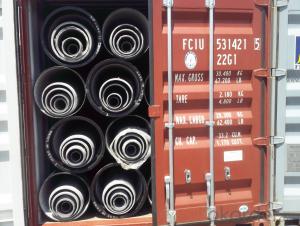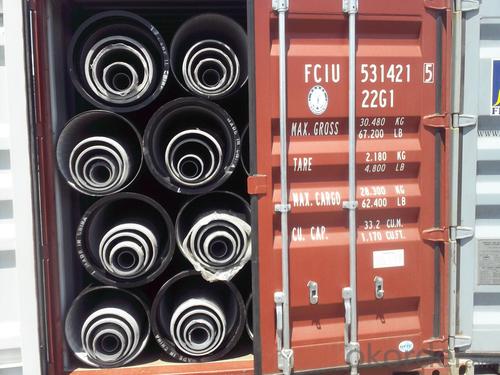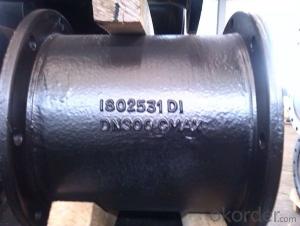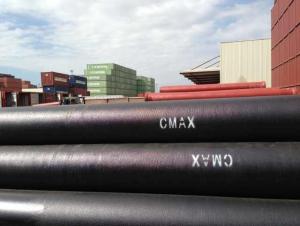DUCTILE IRON PIPE k14 DN 350
- Loading Port:
- Tianjin
- Payment Terms:
- TT OR LC
- Min Order Qty:
- -
- Supply Capability:
- 30000Tons m/month
OKorder Service Pledge
OKorder Financial Service
You Might Also Like
CNBM ductile iron pipe ranges from DN80-DN1600mm (T-Type, Class K9), effective length 6m, comply with ISO2531 Standard
Company Profile
CNBM International Corporation is the leading production base and renowned supplier of Ductile Iron Water Pipe systems of both potable and waste water in China. We are constantly looking to develop high quality products to ensure the longest service life and wonderful performance.
CNBM Pipelines regard quality as the essential factor leading to successful business. Every pipe is tested in accordance with BS EN545 (water application) or BS EN598 (sewer application). CNBM Pipelines products comply with and are tested according to the relevant European and International Standards. Our pipes are manufactured under the quality management system BS EN ISO 9001. After years of efforts, CNBM Pipelines has built up great reputation in terms of quality and service among customers worldwide
Product Introduction
CNBM ductile iron pipe ranges from DN80-DN1600mm (Tyton, T-Type, Class K7/K8/K9), effective length: 6m, complying with BS EN545/EN598/ISO2531/BS4772.
Specification& Payment terms
Internal lining: Pipes shall have an internal cement mortar lining in acc with ISO4179.
External coating: Pipes shall be externally coated with metallic zinc spray plus a further layer of resin painting to ISO8179.
Gasket: 100% SBR/NBR/EPDM gasket in accordance with ISO4633.
Packing: Pipes from DN100 to DN300 be bundled with steel belts, the others are in bulk.
Payment term: By 30% T/T advance payment + 70% Irrevocable L/C at sight.
Packing: In bulk vessel or in container.
- Q: What are the different types of ductile iron pipe joints?
- There are several types of ductile iron pipe joints, including push-on joints, mechanical joints, restrained joints, flanged joints, and grooved joints.
- Q: Are ductile iron pipes suitable for use in acidic environments?
- Ductile iron pipes are generally not suitable for use in highly acidic environments. While ductile iron is known for its strength and durability, it does have limitations when it comes to acidic conditions. Acidic environments tend to corrode and degrade ductile iron pipes over time. In acidic conditions, the acid can react with the iron in the pipe, causing corrosion and ultimately leading to pipe failure. The rate of corrosion depends on various factors such as the concentration and type of acid, temperature, and the duration of exposure. Acidic environments with pH levels below 4 or 5 can significantly accelerate the corrosion process. To overcome this limitation, other materials like stainless steel or corrosion-resistant alloys such as PVC or HDPE (high-density polyethylene) pipes are often recommended for use in acidic environments. These materials have better resistance to corrosion and can withstand the harsh conditions associated with acidic environments. However, if ductile iron pipes are used in mildly acidic conditions or if measures are taken to protect them from corrosion, they may still be suitable. Applying protective coatings or linings to the pipes can help minimize the corrosive effects of acids. It is essential to consult with experts or engineers familiar with the specific conditions and requirements of the project to determine the most suitable material for use in acidic environments.
- Q: What are the different methods for tapping ductile iron pipe?
- There are several different methods for tapping ductile iron pipe, depending on the specific requirements of the project. Some of the common methods used include: 1. Mechanical Tapping: This method involves using a mechanical tapping machine to create a hole in the ductile iron pipe. The machine is equipped with a cutting tool that rotates and cuts through the pipe wall, creating a clean hole. This method is commonly used for smaller diameter pipes and is relatively quick and efficient. 2. Hot Tapping: Hot tapping involves creating a hole in a pressurized ductile iron pipe while it is still in service. This method requires specialized equipment and expertise to ensure safety and maintain the integrity of the pipe. Hot tapping is commonly used when it is not feasible or practical to shut down the pipeline for maintenance or repair work. 3. Electrofusion Tapping: Electrofusion tapping is a method that uses an electrofusion saddle and fitting to create a branch connection on a ductile iron pipe. This method involves welding a fitting onto the pipe using an electrofusion machine, which creates a secure and leak-proof connection. Electrofusion tapping is commonly used for larger diameter pipes and is suitable for both water and gas applications. 4. Saddle Tapping: Saddle tapping involves attaching a saddle or clamp onto the ductile iron pipe and drilling a hole through the saddle into the pipe. The saddle is then equipped with a threaded outlet for connecting a branch line. This method is commonly used for smaller diameter pipes and is relatively simple and cost-effective. 5. Split Sleeve Tapping: Split sleeve tapping is a method that involves cutting a section out of the ductile iron pipe and installing a split sleeve over the cut. The split sleeve is then bolted together, creating a secure and watertight connection. This method is commonly used for larger diameter pipes and is suitable for both water and gas applications. It is important to note that the selection of the tapping method should be based on factors such as the pipe size, pressure rating, required branch connection, and the specific requirements of the project. Consulting with a professional engineer or tapping specialist is recommended to ensure the proper method is used for tapping ductile iron pipe.
- Q: Do ductile iron pipes require cathodic protection?
- Yes, ductile iron pipes do require cathodic protection. Cathodic protection is necessary to prevent the corrosion of ductile iron pipes, which can extend their lifespan and maintain their structural integrity. The protection is typically achieved through the use of sacrificial anodes or impressed current systems to counteract the natural corrosion process.
- Q: Can ductile iron pipes be used for stormwater management?
- Yes, ductile iron pipes can be used for stormwater management. Ductile iron is a strong and durable material that is resistant to corrosion and can withstand the high flow rates and pressures typically associated with stormwater management systems. These pipes have been widely used for various applications, including stormwater drainage and sewage systems. Their ability to handle heavy loads and withstand environmental factors makes them a suitable choice for stormwater management, ensuring efficient water flow and preventing flooding in urban areas. Moreover, ductile iron pipes have a long lifespan, reducing the need for frequent maintenance and replacement, making them a cost-effective choice for stormwater management infrastructure.
- Q: What is the typical weight of ductile iron pipes?
- The weight of ductile iron pipes can differ according to their size and thickness. Nonetheless, as a broad reference, smaller diameter pipes typically weigh around 1 pound per foot, while larger diameter pipes can weigh several hundred pounds per foot. The weight of ductile iron pipes is influenced by factors like the dimensions of the pipes, the thickness of their walls, and the particular requirements of the intended use. It is essential to acknowledge that these weights are approximate and subject to variation depending on the manufacturer and product specifications.
- Q: What kind of joints are used with ductile iron pipe?
- The most commonly used joints with ductile iron pipe are push-on joints and restrained joints.
- Q: Are ductile iron pipes suitable for use in wastewater treatment plants?
- Yes, ductile iron pipes are suitable for use in wastewater treatment plants. Ductile iron has excellent corrosion resistance, high strength, and durability, making it ideal for handling the harsh and corrosive environment found in wastewater treatment plants. Additionally, ductile iron pipes have a long lifespan and can withstand the high-pressure demands of wastewater systems, making them a reliable choice for this application.
- Q: Can ductile iron pipes be used in tunneling or microtunneling projects?
- Yes, ductile iron pipes can be used in tunneling or microtunneling projects. Ductile iron pipes are known for their strength, durability, and flexibility, making them suitable for underground applications. They can withstand the external pressure exerted by the surrounding soil or rock during tunneling, ensuring the integrity and safety of the project. Additionally, ductile iron pipes have excellent corrosion resistance properties, which is crucial in tunneling projects where the pipes are exposed to moisture and other corrosive elements. Their smooth internal surface also facilitates the flow of fluids or materials through the pipes, making them an ideal choice for tunneling or microtunneling projects.
- Q: Can ductile iron pipe be used for water distribution systems in cold climates?
- Yes, ductile iron pipe can be used for water distribution systems in cold climates. Ductile iron has excellent resistance to freezing and can withstand extreme cold temperatures without becoming brittle or cracking, making it a suitable choice for water distribution systems in cold climates.
Send your message to us
DUCTILE IRON PIPE k14 DN 350
- Loading Port:
- Tianjin
- Payment Terms:
- TT OR LC
- Min Order Qty:
- -
- Supply Capability:
- 30000Tons m/month
OKorder Service Pledge
OKorder Financial Service
Similar products
Hot products
Hot Searches
Related keywords






















